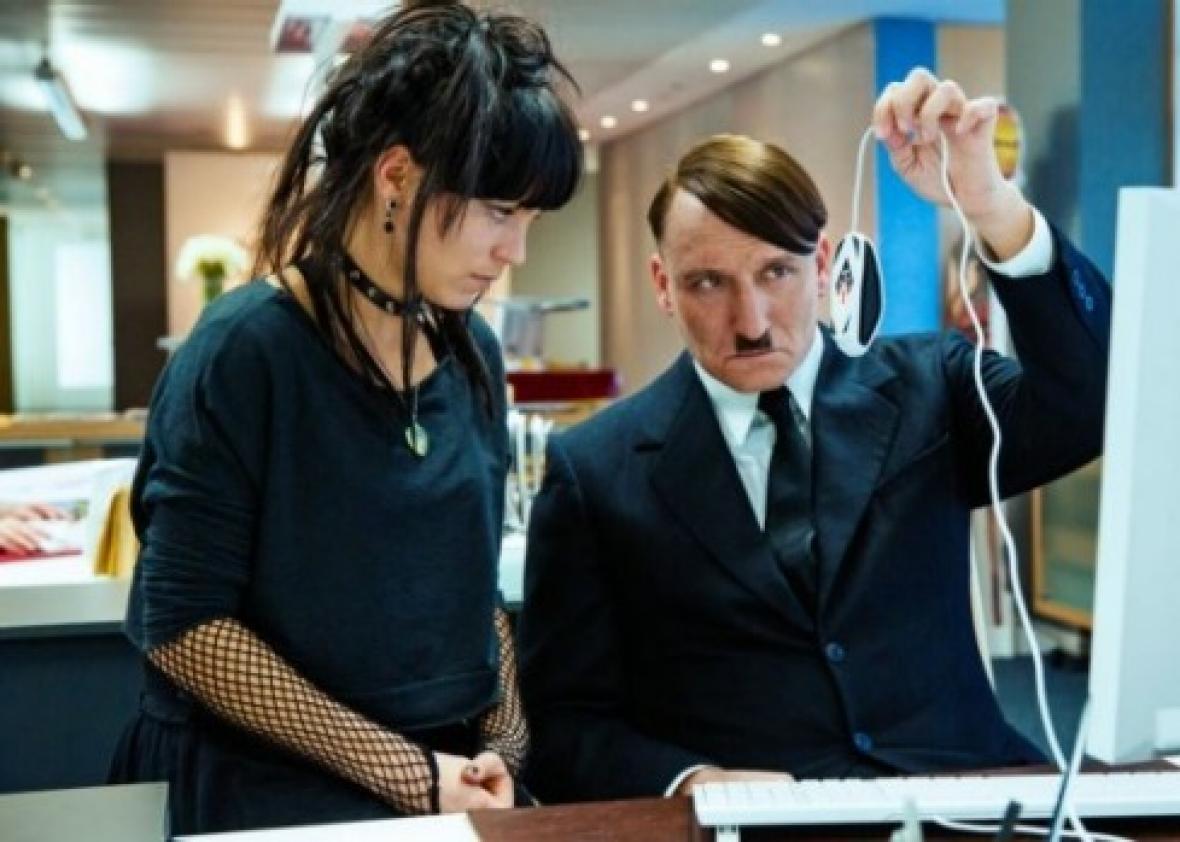It is inconceivable that the perplexing, didactic, and often very funny German film Look Who’s Back (Er ist wieder da)—now streaming on Netflix—would have made it out of a pitch meeting alive, had it not been based on a wildly successful novel of the same name by Timur Vermes. Because that pitch would have gone like this:
We’ve got Hitler, right? Like, the real Adolf Hitler, mysteriously teleported to the present, walking around just, like, being Hitler. And he becomes an internet celebrity. Also, like, sometimes the movie goes fully unscripted, and we have a guy dressed as Hitler interviewing real Germans and getting them to say racist shit.
But yes, this movie exists, and despite (or perhaps because of) its genre-defying weirdness, you won’t be able to look away. How does Hitler (an uncanny, if “less shouty,” Oliver Masucci)—re-ingratiate himself into German society? It starts when he gets booked as a guest on a shock-comedy show called Krass, Alter! (Whoa, Dude!). In a Producers-esque twist, Hitler joins the show because its Machiavellian showrunner wants to destroy his boss; what could be a better career-killer than a really committed method comedian (as everyone assumes Hitler is) going on live German TV as der Führer?
“Give me one-liners about Jews, gays, immigrants, concentration camps,” the showrunner instructs his horrified writing staff. Meanwhile, Hitler is given his own office at the station and learns all about the internet. (The first thing he Googles is “world domination.”) To everyone’s shock, Hitler—who in his first appearance goes off script into a stirring excoriation of contemporary German television, which he characterizes as a Nietzschean “abyss”—is a huge hit. Soon he’s tearing up YouTube and on every talk show.
Taking the edge off this clever but predictable farce (a white supremacist media star? You don’t say!) are the film’s eye-popping and Sacha Baron Cohen–esque unscripted bits, wherein Masucci, in character, talks to the German common man and gets actual Germans to speak confidently about, among other things, the violent tendencies of “immigrants’ kids” and how they wish for the return of “labor camps.”* (Hitler says: “I’ll take care of it.” The Germans nod appreciatively. Really.)
The movie was a sleeper success in Germany, and the sensation it (and the novel) caused has quite a bit to do with how uncommon it is for German audiences to see the Nazi era in a comic context. Sure, to an English-speaking audience, mocking Hitler is pretty old-school. Anglophones have been doing it since The Great Dictator; aside from The Producers, some of the best entries in the oeuvre include Mel Brooks’ 1983 “To Be or Not to Be (The Hitler Rap)”; the beloved meme of re-subtitling this scene from Downfall; and this magisterial 1998 sketch from Mr. Show, in which every descendent of a Holocaust victim gets a Hitler clone to do with what they wish.
But even upon the release of Vermes’ novel in 2012, the Führer was no laughing matter in the Vaterland. (And, according to some critics, still isn’t.) Germany’s official postwar role in perpetuity has been one of mournful introspection and sincere remorse, much of which has been immortalized in legislation. The swastika and Heil Hitler salute, for example, are illegal there. (That’s right; if you want to do your Sieg Heil in peace, you gotta come to a Donald Trump rally.) It’s not exactly an environment ripe for farcical goose-stepping.
So Vermes’ book, which has sold over 2 million copies worldwide, caused a sensation for flouting what is probably the biggest humor taboo in a country accused of having no sense of humor at all. But in the end, the novel was more than anything a pointed commentary on contemporary German nativism and racism in all of its disturbing forms. The film is no different. Its message is hardly subtle: Rather than being wieder da (back again), the core of the ideology that allowed millions of regular people to support Hitler is immer schon da (always there).
*Correction, May 13, 2016: This post originally misspelled Sacha Baron Cohen’s first name.
